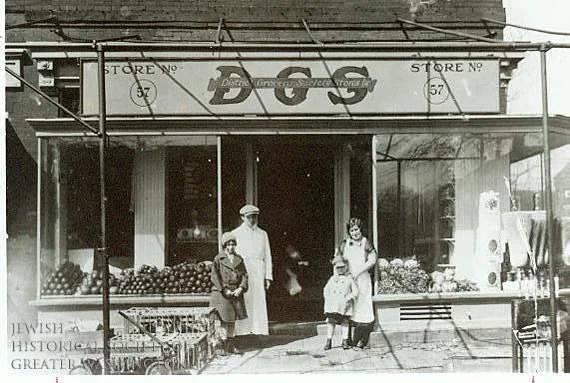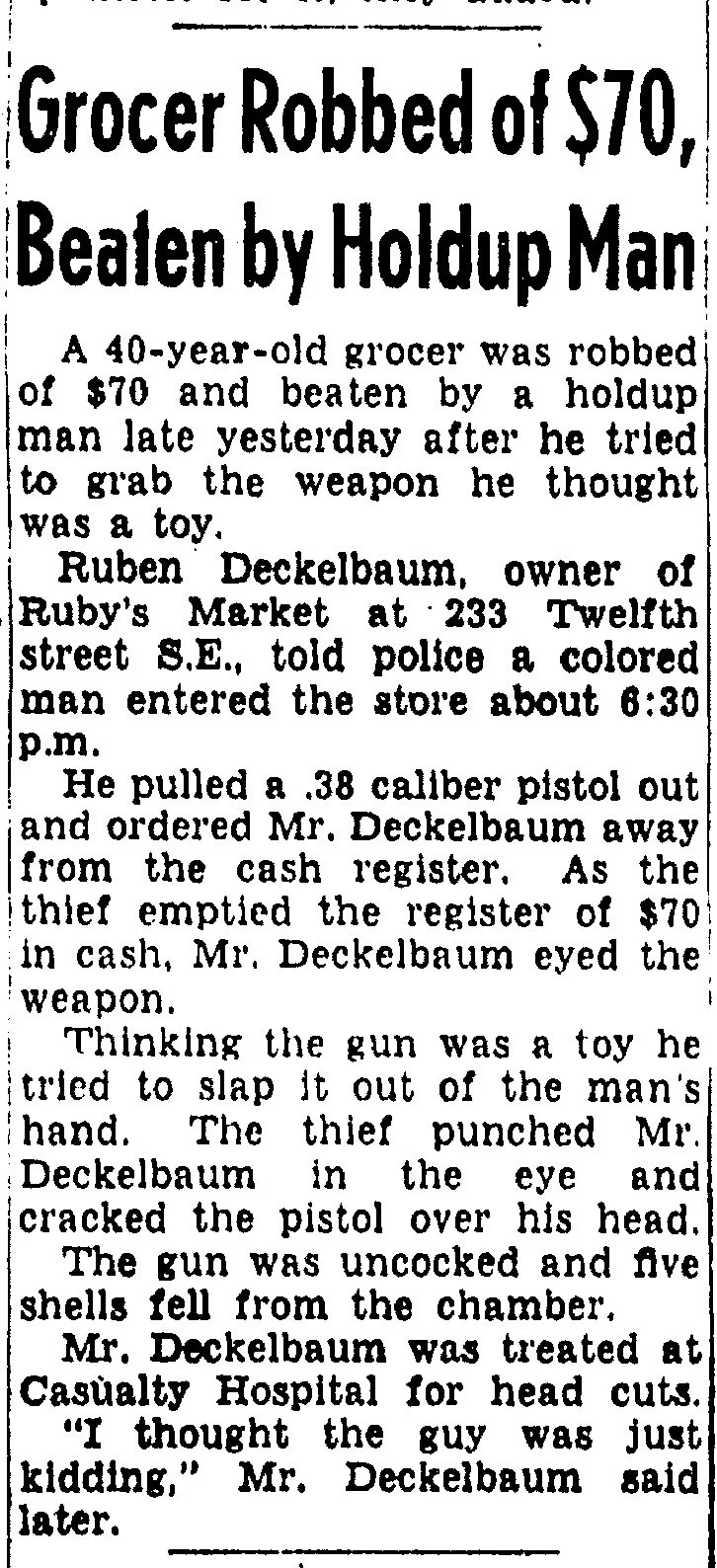
Corner Store History
What’s in a name?
Built in 1916, the small grocery store at 233 12th Street SE now fondly called “Mott’s”, has had various names over the decades. The current name, “Mott’s Market,” first appeared in 1962, when the store had a new proprietor, Murray Wollstein. Mott’s was a modified form his Yiddish nickname “Mottel”.
The S & A Market, 233 12th St SE, rented for a GOP movie.
The Washington Post - September 30, 1956
The Beginning
233 12th Street SE was built and owned by Jewish immigrants fleeing repressive Russia. The store was Jewish-owned (as were many of DC's corner stores) for much of its history.
From the beginning, the three story (plus basement) brick building with a tin mansard roof (cost to build: $4300) was a grocery store. The building's architect and contractor, Israel Diamond, went on to build many of DC's Safeway stores.
The building's first owner and grocer was Samuel Gotkin; soon after, a man named "H. Sher (or Sherr)" was running the store. Gotkin went on to a long career as a grocer in Northwest DC. The store served a fast-growing, multicultural neighborhood.
1921
In 1921, the store became a founding member of the "District Grocery Society" (later "District Grocery Stores"), which would shape everyday life in the District for decades. DGS helped Jewish grocery store owners fight discrimination from non-Jewish wholesalers and increase their buying power. Members paid $2500 to join and put up DGS signs in windows and above doorways.
In just three years, DGS grew to over 300 retailers, taking out regular advertisements in the Post and the Evening Star. Corby Cakes, Uneeda Biscuits, Gelfand's Mayonnaise and much more were "Located within easy reach of every housewife." (You could even buy "Mott's Sweet Cider" for 25 cents a quart.) Later, DGS stores even offered delivery: select your food in the store and the grocer would send it home in a "familiar orange DGS delivery truck."
Example of a DGS store—Immigrants Morris and Jennie Vigderhouse ran a DGS store at 1030 North Capitol Street NW. Pictured here are Jennie and two of their children with a shop employee, late 1920s.
Evening Star - July 22, 1921 - page 11.
“Three rooms, hot-water heat, gas, electric lights; rent, $30/month”
1920s & 1930s
By 1924, the store had passed to David Minkoff, who is listed as the store's manager through the 1930s and seems to have owned at least one other store in the area. (Minkoff's son, Leonard, was apparently a successful orator at Eastern High School: in 1929, he was named one of Eastern's finalist in a national competition for his work, "The Influence of the President on Legislation.")
Often, the store's owners made extra money by renting the space above the store. Sometimes the classified ads are for a three-room apartment ("Three rooms, hot-water heat, gas, electric lights; rent, $30/month," read a 1928 listing) and sometimes for a room ("Nicely furnished room for 1 or 2 refined Jewish boys, convenient 2 carlines" read a classified ad in 1941).
Evening Star (published as The Sunday Star)
November 2, 1952 - page 3.
In 1944 the store was listed as "Lincoln Market" on a liquor license application. This may have been Mott's' original name.
1944
In 1944, Reuben Deckelbaum, who took over from Minkoff, listed the store's name as "Lincoln Market" on a liquor license application. This may have been Mott's' original name. Deckelbaum soon changed the store's name to Ruby's Market. (He eventually owned a total of three grocery stores in the District.)
1952
Though the store thrived, Deckelbaum faced some adversity, particularly in 1952 when the store was robbed twice in two days: on November 1, three men on a six-store crime spree held up Ruby's Market. The next day, a man holding what Deckelbaum thought was a toy gun burst in and started going through the cash register. Deckelbaum tried to smack the gun out of the assailant's hand; the gunman punched the 40 year-old grocer in the eye and hit him over the head with the .38 caliber pistol. "I thought the guy was just kidding," Deckelbaum later told the Evening Star.
1956
By 1956, Harry Rubin ran the store, which was now called "S and A Market." Rubin was part of the most notorious episode in the building's history: a fake Republican film called "The Republican Small Business Program." For $40, Rubin left the store for two hours while a film crew and actors moved in. The film claimed to feature an "'actual businessman' who received and is still eternally grateful for a Small Business Administration loan." The only problem? It was all bunk. S and A Market had not received a loan, the film's "Mrs. Fraser" who "runs the cash register and helps" was actually Martha King, a secretary for the National Republican Campaign Committee, and the "customer" was really a Georgetown student who worked for the Committee. The Post exposed the fraud under the headline, "GOP Film Is Make Believe."
1962
In 1962, the name "Mott's" emerges in the record for the first time, as part of Murray Wollstein's liquor license application. (Wollstein also faced unhappy crime: on the morning of July 2, 1969, two men robbed Wollstein at gunpoint, taking $60 and locking him in the basement. Wollstein appears to have persevered, but at 10:15am on September 17 of the same year, Wollstein was robbed at Mott's again.)
1970s—Today
The DGS conglomerate broke up in 1971, signaling the end of the corner market heyday in DC. Bigger supermarkets and lower prices trumped neighborhood convenience, and in the following decades the great majority of the District's corner stores converted to residential housing.
In the 1970s, Myong Pyo Kim is listed as the owner of Mott's; for much of the 80s through 2010, Hyon Ku Choi and Young Hui Kim owned and ran the store. In 2010, they turned operations over to the Cho family, which ran the store with love until early 2022.





